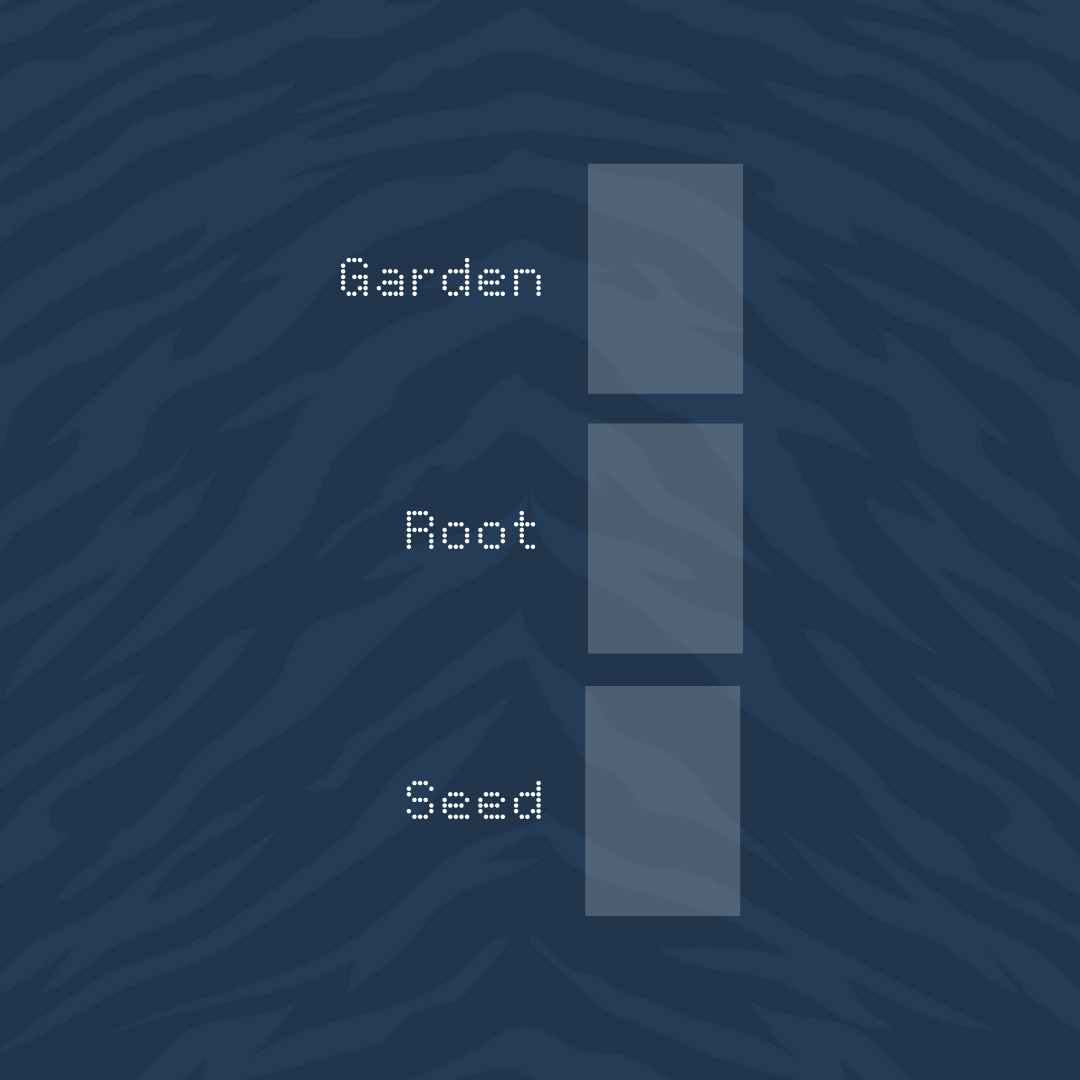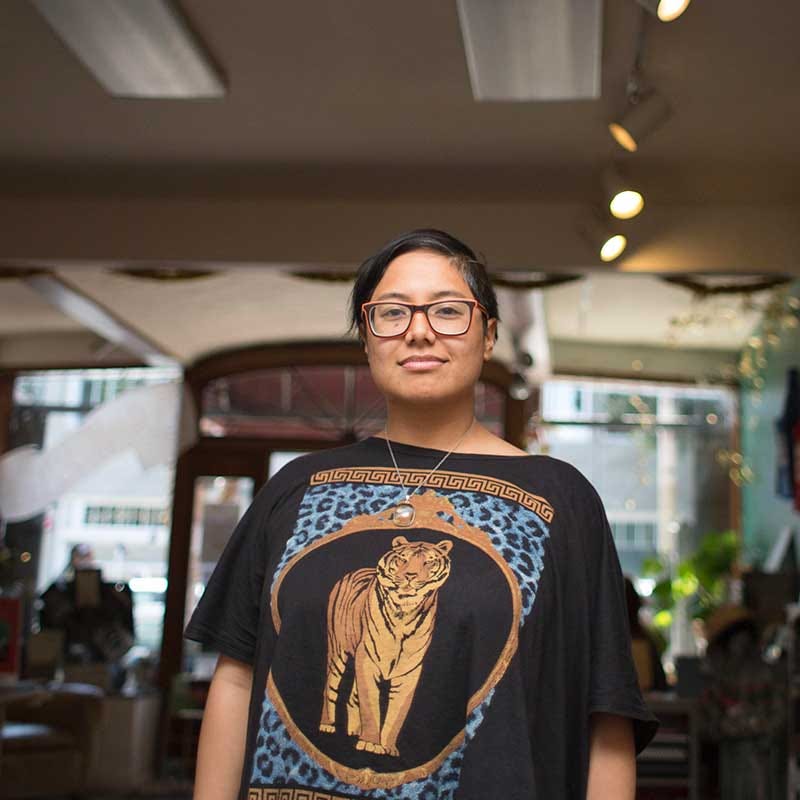This is Five and Nine, a podcast newsletter at the intersection of magic, work and economic justice. Welcome to Episode 001.
This episode features a live reading and a reference to the Seed Root and Garden spread in action. As a very visual medium, the tarot benefits from being able to engage with the imagery of the cards, and we include the images from the Rider-Waite-Smith deck for reference. See our previous newsletter to learn more about the Seed Root and Garden spread.
Listen to the podcast now, or read the transcript below, or both!
Ana: That was "Tiger Rag," performed by the Original Dixieland Jazz Band in 1918.1 It's part of 400,000 sound recordings made available in the public domain this year. It felt like an appropriate tune for this month because this month marks the Year of the Tiger.
Hi everyone. My name is Ana Mina, AKA An Xiao. I'm an author and intuitive coach working from Tongva, Ohlone and Lenape land. I serve as the producer on this project.
Dorothy: Hello. My name is Dorothy Santos. I'm a writer, artist, and educator based on Ramaytush Ohlone land. And I'm one of the Directors of Magic for Five and Nine.
Xiaowei: My name is Xiaowei Wang, and I'm an author, artist and scholar based in Ohlone territory. I'm one of the Directors of Magic and Creative Director on this project.
Ana: So we started Five and Nine as three friends from the art and technology world and kind of realized that we are interested in also these issues around magic, tarot, how that fits in with topics around work, economic justice, and decided to put this podcast and newsletter together as a way to foster the conversation, bring a critical discussion to these topics. Especially, especially right now, during this time when there's so much confusion, so much concern around the future of our planet.
Xiaowei: So I have had the privilege of working with both of you on various professional projects. And I feel like I've learned so much in terms of how to balance both doing creative work, doing meaningful and impactful work, as well as trying to pay the bills and think about student loans.
And so I'm hoping that this newsletter really opens up a lot of difficult conversations that are often sidestepped about the actual process of how to do things.
Dorothy: I, aside from adoring the two of you, and again, also making magic in different permutations in the world. I also just saw this as a Thundercat call, and I am really Lion-O, but I'm probably in a Snarf body. That's fine. I'm okay with that. I almost feel like working on something outside of work and academia that allows me to be much more expressive in how I want to talk about work and labor and career and the differences between those three things.
It really is because I think we need paths and avenues that allow us to think a little bit more abstractly about the every day, because sometimes the banal and the mundane of something as simple, which we'd like to think is simple, like earning money, building a portfolio, having a new skill, like those, those aren't actually as banal as people think.
Xiaowei: In some ways, I think of Five and Nine as — and to pull in my mom here, she always says, “I like to share my mistakes with you, so you don't have to go through them, Xiaowei.”
And I see ourselves as having this circle of magic, where we share observations, mistakes, moments of failure or contemplation as we've tried to navigate this work-centric world that we live in, while at the same time balancing our values and also the amount of debt that we owe to the US government.
Dorothy: So for me, it's this ongoing archive of our thoughts and observations on how capitalism has actually affected each of our practices as artists, writers, and also people that I've had an engaged in professional work in various ways.
Ana: There's the very practical and the very magical, and how do you balance those things? How do you talk about those things? I think all three of us have been engaged in this conversation for years now. It's good to talk about that and to ask ourselves, what does it mean to do work in a world that's so deeply unjust?
Dorothy: I remember one of the things my mom said to me when — and I was actually on TV, like the evening news, at a protest one time.
And my mom said something really interesting — and I don't critique her for this, I understand it, but it is complicated, it's been over a decade — but my mom said, "I didn't immigrate to this country for you to suffer or risk your wellbeing in your life for other people."
And I didn't know actually how to respond to her. But when you come from an immigrant family, the nine to five thing actually doesn't exist. All of my life as a kid, my grandparents woke up — actually, they woke up at five in the morning, my dad woke up at four, and the workday was atypical all the time, because it was more about survival than it was about thinking about a career.
And even before I had the language of economic justice, I did also have magic. And I think the confluence of all those things in my life now, decades later, is for a reason. And I feel like I'm doing so many things later in my life, and I think that's another consideration when thinking about this work that we do — is this kind of intergenerational dialogue around what these things actually mean.
Xiaowei: For a long time, my mom had that attitude, and I think still does to some extent, but I realized it's because she's coming from a culture where the social safety net is there already. And oftentimes it comes in the form of family. Coming from a big sprawling Chinese family, like, say what you want, but I have cousins who are queer who are maybe not accepted in mainstream Chinese society, but it's always, the bottom line is, your family is there to provide for you and to always accept you.
And then on top of that, you have this broader social safety net in China. And so in some strange way, I realized, I guess I could understand how it's a little bit perverse to like get paid just to be in a society where that kind of social support and social benefit is not the default.
Ana: I kinda like where we landed with that name, Five and Nine, the symbology of five as this turning point, the nine not quite the completion, but almost there, kind of rethinking this whole thing.
Dorothy: Ana, you just read my brain. You know, numerology is, has always fascinated me. And I think one of the things that I love about the name that we chose is five in the tarot is also about conflict and challenges and how you battle something out.
So even if we look at the different suits, Five of Swords, Five of Pentacles or Coins, et cetera, and as someone who comes from this background of visual and critical studies, I always look at the symbology. And the Five of Swords is always this really tricky card to talk about because it's someone walking away from — it's people walking away from one another, but are you the victor, or are you the person who has been defeated? And this is what is so freaking magical about the tarot is that you actually don't know that until much later on.
And so when I think of the Five of Swords, or I think of any of the Five of fill-in-the-blank suit, I think of that, that in one way, shape or form you can explain something. I think there's a great responsibility when being a tarot reader as well, because you have to not just actively and deep, listen to someone, you also have to, there's so many other things involved, body language, context, reading the proverbial room.
But then it's also Five AND Nine. It's not Five TO Nine. And I know I'm being a real semantics geek right now, but as you mentioned, Ana, Nine isn't actually about completion.
It's about just getting there, just getting there. And so, I love that as simple as Five and Nine sounds, it's actually much more complex, and the tarot actually tells a deeper, broader story. And I think that's what's so beautiful about it, and why I've loved it ever since I was a teenager.
Xiaowei: I love that term, "reading tarot and reading the room," because one of the things that I think for folks who maybe have never read tarot or just tangentially know about it, it's like, where does this come from? Where does all this knowledge come from that you're spitting at me during this reading?
And I think that points to how we've really constructed these ways of where knowledge comes from. Especially in the West, knowledge comes from seeking. It comes from actively downloading comes from probing, I think of Jeff Warren's work and when he talks about microscopes and how with a lot of modern microscopes, you're like actively shooting radio waves at the object.
But the very flip side of that, the tarot really surfaces is that it's about tuning in, that actually all of this knowledge, all of these reflections, all of the wisdom to be gained, it's there already. And tarot is this way of helping us tune in to the things that are already there.
And, there are so many practices that fall into alignment with that as well, like walking meditation, things like that. And I also love reversals2 because when I was taught to read reversals by Eliza Swann from Golden Dome, she posed reversals as an exclamation point. And again, too, I think we're just so used to thinking in binary. So like a reversal — "something that was good is now bad" — but actually that's not it. There's always this Middle Way in between, which is what we have to tune into.
Ana: And so it's the “Middle Way Podcast.”
Seed, Root, Garden Spread (11:25)
Ana: Dorothy and Xiaowei are the Directors of Magic for this project, and they created a spread for the Year of the Tiger.
Dorothy: Yes: seed root garden. It is a three card spread that looks at and asks and prompts the querent — or I also want to be very expansive here for anyone who is interested in reading for other people. The seed card is what needs to be planted. The root card is how to best cultivate, and the garden card is what environment, place and/or space — however you want to think about that — is needed to have this root bloom even further and to grow and be attuned with the seasons.
And the reason why I talk about shape of a spread and that there's variations of it, that if you wanted to create a triangle, so, you know, at the bottom left of this is a seed. The top is the root. And then the lower right-hand corner of the triangle is the garden. That's one way of looking at the shape of the spread.
But you can also have the seed at the bottom. And then on top of that is the root card. And then on top of that is the garden card. For those of you that are not familiar with tarot, the basic three-card spread oftentimes represents past, present and future.
Sometimes when I do three card spreads for people, and I say, "Okay, we're going to just do something quick and dirty. We're going to do past present future." It's very daunting for a lot of people because that timescale is just like, "Whoa, wait, my whole life? You mean like my whole ass past? Like, that's a lot to think about!"
But when you think about it in the context of seed root and garden, playing around with a different — not just semantics, but meaning of what a three-card spread could mean and could be for you, dear listener, I think what I'm hoping for is that there's something in particular that you're wanting to seed. So if you already know, I want to gain a skill that allows me to work with the community more. So that might mean I really love design, so I want to create flyers, or I want to help with PR or social for a campaign.
Well, that's the seed, and then you kind of have an idea of what you want to root and, you think, well, this is kind of best rooted in community. The things that I want to do. And the garden that you want to develop off of that, the environment you want to create is not just context for who else is riding with you, but what do you need? What kind of environment do you need to actually cultivate and continue cultivation of that?
And the seed root and garden spread is just one avenue and one path for you to learn even the language of the tarot. Depending on what cards you get, it's infinite, the combinations you can get. Then the tarot, albeit the universe, starts to talk to you through that and how you might understand, okay, well, you understand what your seed is, but maybe this is the thing that you need to understand. Maybe there's a decision that you need to make, maybe you're getting the Two of Cups here, so you have some type of feelings and emotions around a decision based on the seed that you actually want to plant, et cetera.
Xiaowei: So part of our work at Five and Nine is thinking about the different seasons, and being that it's both winter in North America, where we all are currently, as well as Spring Festival or Lunar New Year, it's really a time to start planning out the crops or the garden.
One of the things that really came up was a conversation that we had last year around this time. Oh God, now my brain is like, what is, what is time? 20—? No, the year before 2020, during September and October, Dorothy, you and I were talking about the fires and everything going on and kind of this phrasing of people saying, it's the end.
And I think we have a very simplistic notion of the end, and we forget that it's actually like, there's a lot of other things like composting, or just a cycle of things that happened.
Dorothy: I will cite Mama Dulce here, my mother, who texted me this morning saying that she was watching a UFO documentary on Netflix and how she said, well, you know, this isn't the end of humanity. This is a lesson in how we need to survive, need to change. And you do that through very intentional, slow practice.
Okay, let me pick the easiest plant. So pothos. One of my good friends, Helen Tseng, they sent me something like apartment therapy. I don't even know if it's from that, but I started getting into plants more a few years ago, and they gave me a trimming of their pothos, and it's grown considerably. I actually have different trimmings all over the apartment that I live in.
But the article I think they sent me, it had the line or the headline was, “The stupid, easy plant to take care of.” And I'm sharing this because even at the rate that the potho grows, it's a reminder of duration and time and what you're doing and where you were when you first took care of the trimming when you first planted it.
And, obviously, my planting skills have graduated to other plants. I'm bringing this up related to the spread because I remember my mom, she was scared for her plants when she would travel because she would say, “Oh God, I know I'm going to come back to one or two of my plant babies, and they're completely dead.”
And that was the case when I took care of it, but not anymore. But I think that was one of the foundational aspects of coming up with this spread with you was if we think about this and apply it to the way we look at how we show up in the world and how we are present with other people, whether it's through our work or community organizing or artistic practice, how do we take a seed and cultivate it? And what do we do with the roots when they come in and what should we consider?
Because even before you plant a seed, you actually have to know whether that seed is going to grow in the environment you're placing it in, because some seeds just won't grow. And sometimes you learn those lessons after the fact.
I think we came up with variations on how this might look for someone. And that was something I felt was very important because some people want to see the seed root garden relationship as a triangle. Some people might see it as an actual sprout, something that grows vertically, but it's pretty open. And I think that's what I love most about what we came up with.
Xiaowei: Yeah. And as an avid gardener I think there's just always a magic that I encounter when it's early morning and I get to really be with the plants, and plants just go through this. You can kind of tweak it through adjusting the environment. But it's like, they just grow. No matter what, they will grow, even if they're outside, and you're like, I forgot to water them. They will grow towards water. So this kind of magic of survival and of life and this kind of vital force is really powerful to me.
I think it's also incredible how a flower, it goes to seed, it just has this kind of intrinsic lifecycle. And to me that reminds me of the power of just knowing when certain things are enough. And what I mean by this is when I first started reading tarot for myself, it was like really in my wishes.
Like, “I have this wish to achieve this thing and how do I get there? And the tarot will help me do that.” And now looking back upon it, it's very simplistic. It's more just like, “How do I tune in to try and figure out this garden in this season?”
And very practically, earlier this week, I was talking with a friend who was not sure if he should leave his job.
He was like, "But when will I know?"
And I was like, "Well, you'll know when you know." And not to sound cryptic about it, but he was kind of going on about how he didn't like this new set of managers that were hired, things like that.
And he was like, "Oh, but I don't want to leave because of that."
And it's like, “Yeah, exactly.”
The decisions that you make have to come from that same force of a flower. It just, , blooms, it just opens up. It has to have that same kind of energy. And so I think this spread really reminds us of that in its formation.
Applying the Spread (20:41)
Ana: Should we do a reading for ourselves for this project?
Dorothy: I mean, I am down for that. Who's gonna pull a seed card?
Xiaowei: Do you want to?
Dorothy: Sure. I'm picking one right now...
All right. Ready?
Jesus, I got the Five of Pentacles.
Xiaowei: The tarot has a good sense of humor. I pulled the Four of Wands for roots.
Dorothy: Wow. Okay. Okay.
Ana: The garden: I pulled the Tower.
Dorothy: Oh my God. Goddess, really, actually. Holy — so many thoughts...
Ana: Okay. Five of Pentacles. It's a seed that needs to be planted. The root is a Four of Wands, how to best cultivate. And the garden, the environment, and the place that's needed to have this fruit bloom further is the Tower.
Dorothy: I don't think that the Five of Pentacles is meant to be about us. I kind of understood that as the context of what we're in. I know that that the garden is for that maybe, or it might be read that way, but I think the seed that needs to be planted being the Five of Pentacles has more to do with, oh, how have we processed, metabolized, taken in the loss and the grief that we are experiencing in our own individual lives in relation to our communities, our work, professional academic community, and what we witnessed all around us?
And this is going to sound really strange, but sometimes the most beautiful things are seeded from something that is very painful. Like when we read for one another, all we do is laugh when we pull cards, because it's just like, “Oh yeah, thanks, universe, I hear you loud and clear.”
[The Five of Pentacles] is these two individuals, these two figures that are plowing through the snow literally, and one is injured, another one is forging ahead. And then you see these Pentacles at a window. And I felt visually when I saw that, I thought, “Oh, okay, we have to take what we've been given, and that becomes the seed of the work that we do.”
Because it's not just about accomplishments. It's not just about the experiences that we've gained. It's also what we've lost, and the different types of failures we've experienced in our individual lives that bring us together to not just understand one another and how we're going to be in this continuous dialogue, because — and I always tell people this, when I read for them — the tarot is probably not going to mean anything if you don't do the work. And that's what the universe is trying to tell you.
I always have this joke when I tell people, I always am just trying to be the Oracle in The Matrix. You know how she tells Neo in the original Matrix that you didn't come here to ask what to do. But you came here to figure out why you're doing it.
People already know and have decisions made up in their mind. The reason why people go to tarot is they want to understand, well, why do I feel this way? Or they want to seek affirmation or confirmation. A really ethical, responsible tarot reader will always know that you can never predict things and that as painful and as uncomfortable something might be that that might be the actual thing that needs to be planted. So it becomes something different and new and evolves into something unexpected.
Xiaowei: I think one of the things that I love about spreads is that so much of the cards, there's an intrinsic meaning, but then there's also the context that they're in. And to me, there's this element of the Five of Pentacles card that is about relationships to institutions.
And then also people who are these injured people, who are kind of banding together. And at least in the context of the spread that we've just done, to have the root be Four of Wands just highlights that energy for me in the Five of Pentacles even further. That's about coming together to really build this refuge for ourselves.
Dorothy: The one aspect of the card visually I don't like is the representation of disability as a type of thing that communicates loss and grief, and I wanted to just big up and put a little shine on the New World Tarot, which actually represents so many different types of bodies and ability, disability, and all different types of morphologies — human morphologies — that are of strength and a type of relentlessness.
As someone who suffers from chronic pain, it hasn't actually hindered my spirit, and I deal with it the best way that I can. And I'm bringing this up because I oftentimes feel we live in a world, in a culture where those things are not factored in. But they are represented as, you're losing at the game, and the game being, capitalism or, whatever, whatever game you feel that we're all playing.
And I read with different decks for different people. I really love the whole format of, sometimes, if I'm in the mood, allowing my, my querent, the person who has sought a tarot reading to, choose their deck. And that's been a really great practice for me because it really forces me to be present with the person, and to just be in the moment, because I don't know what deck they're going to choose, number one, but also it forces me to really connect with the different visual formats I'm working with, but also the different symbologies. And that's just something that I wanted to point out.
Ana: One thing that I find interesting when I'm talking with people who do these kinds of ancient practices, or old practices, I should say. There's something deep here, but at the same time, the thing that I struggle with is , yeah, the same practice that contains so much wisdom at the same time contains these problematics contains things that we may not agree with anymore as a society or as readers. I feel like we're trying to navigate which wisdom is still relevant, which wisdom is still applicable
Xiaowei: I love what you two have brought up about this kind of duality between tarot and all of these practices as having this kind of ancient wisdom, but then also some problematics. And I think , for me, I always think of in Buddhism, how we talk about the moon is a symbol of enlightenment, but all of this is just pointing to the moon, right? Like, don't mistake the moon for enlightenment.
And that reminds me of reading tarot as well. It has a knowledge of a certain kind, but don't mistake the card for the precise knowledge. I think especially this image of the Tower card, like everything that we're saying and thinking, and our reflections on the tarot. You know, 20 years down the line, the stuff that we're saying now might be entirely antiquated or problematic or so different, and so of this time period. And I am a thousand percent okay with that.
Ana: I'm noticing something, looking at the spread, going from bottom to top, is it's a bit of an ascension into a tower. You have two figures outside, arguably, a building or a tower. And then at the root, those two figures are, instead of maybe struggling outside, are now celebrating it, cultivating it, building something beautiful. And then just as we've been talking about with that cycle — cycles of change, cycles of planting and rooting and gardening — those two figures eventually find themselves trapped in that tower and leap forth.
So many of the people I've been reading for or talking with are finding themselves in this exact intersection right now of trying to get into the game, reaching a point of cultivating and celebrating that, and then finally asking, “Oh, this is right for me anymore?”
Xiaowei: Some time ago, Ana, we were talking about David Brooks and his book, The Second Mountain, and — all my distaste for David Brooks's conservatism aside — I think the Tower also speaks to that kind of Second Mountain notion. That it's not just like you've reached the top — "There you are, enjoy your castle." But there's always more mountains to be climbed.
Dorothy: I think something that's also related, is the Tower is also about coming into a new type of consciousness. I'm kind of citing Rachel Pollack here because I always think about the ways that the bodies are depicted in the Tower and how the head is oftentimes pointing almost directly to the Earth. Yes, you can kind of posit it as a type of death, but it is a type of a forced leap maybe, or a really fast dive into a consciousness that you're not expecting.
And I feel that that is so in relation to what we are experiencing now and when we're doing this project. We're starting it in the midst of a global pandemic. Even just thinking about the tower card, I often times think that what people forget is there's value in understanding and digging through the rubble of the ruins.
That if you want to rebuild something, it's there for you. But the ruins also tell you that what came before it didn't last for a reason. And you may not know the reason of why the Tower has crumbled, but what does it tell you about the land that you're on, in a figurative and literal sense?
What does my mom say? Oh my gosh, I want to bring her wisdom into this. My mom used to tell me like, "No one's going to build a monument for you." Nothing's infinite, and what is infinite is not tangible .
Xiaowei: To me, I think the Tower in this spread, especially as we're reading for our project, also points to how there are so many ways where when we start to talk about work or career, or even magic, it really just becomes about the level of the individual and focused on like, well, what can you do? And the Tower, I think, really embodies an ethos that we all share, which is this broader one of recognizing that the ways that we experience the world, they're part of this bigger sky, this bigger context that we're all part of.
It's very much the way that it's drawn. These people falling out of the tower. It's very much a conditioning that's extremely Western in a lot of ways. There's a type of architecture in Japan, a country that has a lot of earthquakes, where the buildings are made of wood, and they're very lightweight. There's not a lot of glass that's used. And it's built so that it eventually collapses and doesn't hurt the people who are inside of it.
Year of the Tiger (33:31)
Ana: So it's the Year of the Tiger. February 1, 2022 until January 21, 2023.3 And we have just noticed that Dorothy's Zoom profile has her wearing a pretty amazing tiger shirt.
Dorothy: I actually got that thrifting and. I remember the reason why I bought it is because I used to be friends with a couple of stylists, and I remember one of the things they said to me was, "Your attire doesn't match your personality."
I don't think this is going to surprise you two. When I worked at — when I had a corporate life, I always wore, what do they call it? Like, a very east coast palette for like for winter. I always wore gray, black, dark, dark, dark brown, like super dark colors all the time. And they said, "I think you need to start wearing print."
And so this was my compromise when I saw this, and that's why I bought it because I said, “Well, it's still black.” I love wearing black, but I love this animal. And this animal is awesome and there's it's print, so why not?
Ana: And so somewhere in the middle is this amazing shirt that has this beautiful tiger on it.
Dorothy: I mean the one revelatory thing that came out this week when Xiaowei said that tigers sleep for like 12 hours or something.
Xiaowei: Twenty!
Dorothy: Twenty. Okay. And, you know, listen, that sounds amazing.
Ana: That's where they get all their energy, right?
Dorothy: That's true.
Ana: How else are you going to be brave and ferocious if you don't get your beauty sleep first?
Dorothy: Oh my gosh.
Xiaowei: I just love it because it's a kind of reminder of where to save your energy. I'm sure like as big cat predators, they need to eat a lot, but it's like, why spend all your energy chasing down a tiny bamboo rat, if you can sleep for 20 hours and catch something bigger?
Dorothy: I mean, a hundred percent.
Xiaowei: I was checking in with my therapist, and she was like, well, how are you doing on the basics these days? And I was like the basics, like, you know, writing 800 words a day?
And she just gave me this look. And she was like, "That's not the basics. That's high functioning." Literally what she said was like, "The basics is sleeping, drinking water and leaving the house once a day."
Dorothy: Oh my God. Oh my Goddess. Oh, also quick question. In the Chinese Zodiac I'm Year of the Horse. What are you two?
Xiaowei: I'm Tiger.
Dorothy: Oh yeah, that's right.
Ana: I'm a Pig.
Dorothy: I joke around and say I'm a stallion….
Five and Nine is a podcast newsletter at the intersection of magic, work and economic justice. We publish “moonthly” — a newsletter every new moon 🌚 and occasional podcasts on full moons 🌝 — , and we provide an ongoing critical discussion through readings, reflections and debate. In this new world, we’re all rethinking the meaning of work and justice in our lives. Our lives and livelihoods are more essential than ever in identifying ways forward for society that can be grounded in care, compassion and sustainability.
During our pilot period, every issue of Five and Nine is free, and after the pilot, we’ll publish more regularly, with paid and free options. Learn more about us here.
Directors of Magic. Dorothy R. Santos and Xiaowei R. Wang
Creative Director. Xiaowei R. Wang
Producer. Ana Mina (aka An Xiao)
Subscribe now to get our next newsletter, which comes out with the New Moon 🌚 (March 2). As a podcast newsletter, Five and Nine brings the conversation to text and sound. All podcasts are fully transcribed to encourage accessibility.
We sourced the sound recording from Wikipedia and Jazz On-Line.
In tarot, a reversal is when a card is read upside down.
In the podcast, we erroneously said “January 31, 2023.”
















